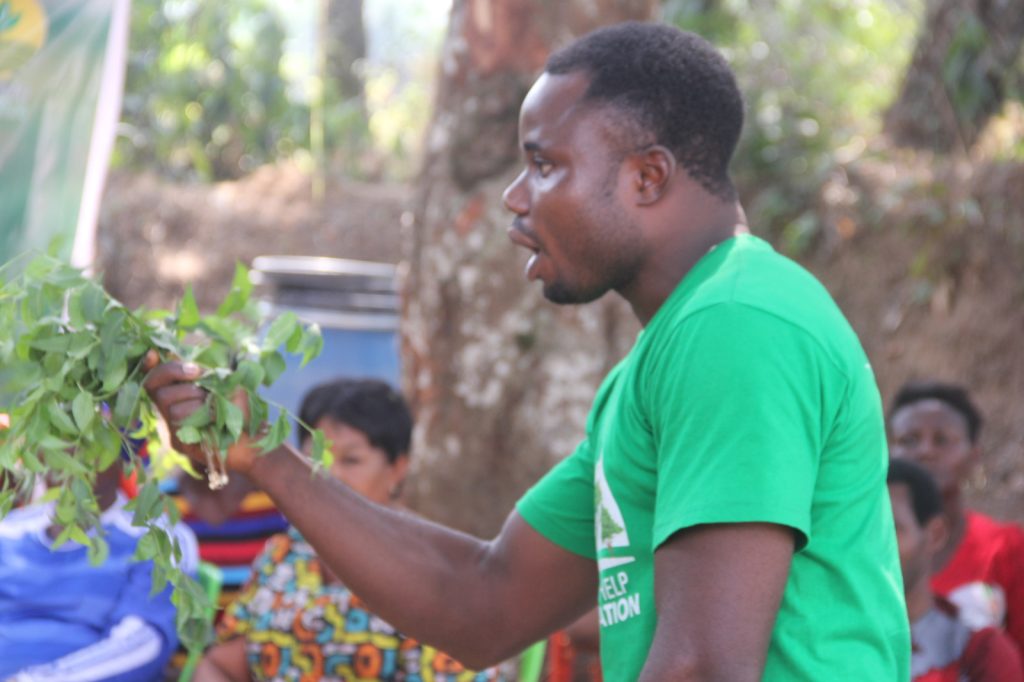Farmers in Uyo Afagha Nkan community in Ikono Local Government Area(LGA) of Akwa Ibom State have called on the Akwa Ibom State Government to ban GMOs and put measures in place to prevent their use in the State. This call was made at a follow-up agroecology training organised by Health of Mother Earth Foundation in the community on the 27th January 2025.
The training which had over 100 farmers participating highlighted the negative effects of GMOs (Genetically Modified Organisms) and synthetic pesticides and fertilisers and highlighted the benefits of agroecological farming. The community demonstrated a strong commitment to adopting sustain-able farming practices and protecting their livelihoods through the establishment of a cooperative farm, with support from HOMEF. This is a significant step towards ensuring the community’s food security and independence on GMOs and harmful chemicals.
According to a study on pesticides which was carried out by the Alliance for Action on Pesticides (AAPN), 80% of pesticides that women farmers in Nigeria depend on are classified as highly hazardous chemicals. Although a few of them have been banned in Nigeria, they are still available on our market shelves. In May 2024, the Director-General of the National Agency for Food and Drug Administration and Control (NAFDAC), noted that over 76% of Nigeria’s agricultural exports are rejected by the European Union (EU) for not meeting safety standards including by having excessive pesticide residues.

It was also noted at the training that several credible studies show that chemical usage has increased significantly since the adoption of GMOs in countries like the USA, contributing to environmental degradation and health issues such as cancer, allergies, and pregnancy defects.
The implication of GMOs on farmers’ rights and on our local economy were also discussed – including that GMOs require farmers to buy seeds in each planting season as productivity reduces after the first season, leading to a dependence on international seed corporations. These foreign corporations seeks to exert control on foods systems across Africa through GMOs to monopolize the seed market.
While referencing the popular Monsanto vs Percy Schmeizer crop contamination case in the U.S, it was noted that there’s a serious risk of gene transfer and contamination of our genetic resources/local seed varieties.
At the end of discussions, the farmers unanimously called on the State Government to ban GMOs and increase support for them in areas of improved storage facilities and extension service.

The second session had the farmers who had participated in the previous training sharing testimonies of improved crop performance following the application of the agroecology principles and methods they had learned.
Mr Tony Akpan shared enthusiastically about the bountiful harvest he got after applying the organic fertiliser he learned on his pepper farm. Other farmers who planted yam and vegetables also confirmed improved productivity due to the use of the organic fertiliser and pesticide.
In the third session, the farmers had a hands-on training on how to produce the Jeevamruth fertiliser and a pesticide using the neem plant(popularly known as dogonyaro), chilli pepper, and garlic. The Jeevamruth fertiliser was made using easily assessable materials including cow urine, cow dung, banana and cow pea.

Key Recommendations/Demands
- The Akwa Ibom State Government should place a ban on the use of GMOs and all highly hazardous pesticides in State.
- The government through the Ministry of Agriculture and Food Security should increase support for farmers through provision of extension service and storage facilities.
- The government should consider producing an agroecology policy to guide research and encourage the practice of agroecology in the state
- The government through the Ministry of Agriculture and Food Security should set up agroecology/organic farms and markets to encourage farmers and ensure consumption of healthy local food.
- Farmers should form cooperatives to encourage knowledge exchange, help with access to land and other farm inputs.






